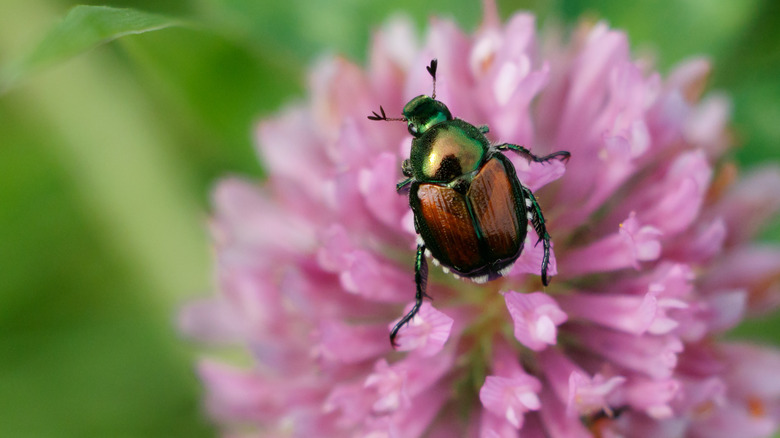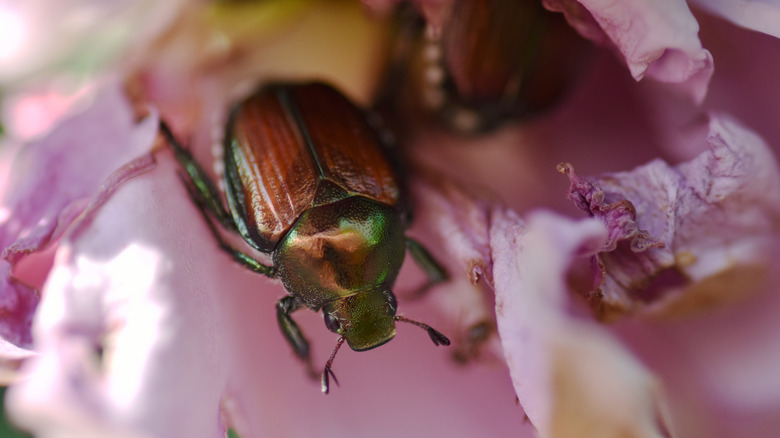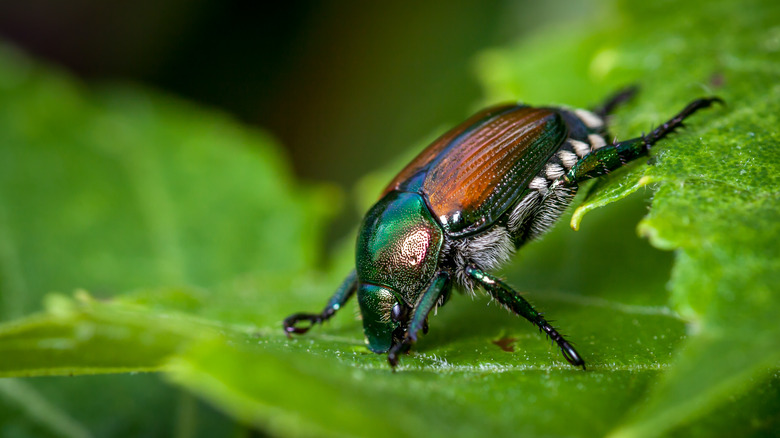Avoid Growing These Plants To Keep Your Garden Free Of Japanese Beetles
Pests are destructive creatures that can wreak havoc, causing extensive damage to plants and disrupting the beauty and yield of outdoor gardens. One notorious example of these pests is the Japanese beetle (Popillia japonica), an invasive insect that poses a significant threat to gardens. These beetles have a voracious appetite and target a wide range of plant species, both ornamental and edible.
Japanese beetles feed on leaves, flowers, and fruits, devastating plants by consuming their soft tissues. This feeding frenzy damages the plant's ability to photosynthesize and weakens its overall health. The beetles also release pheromones that attract more beetles, leading to widespread infestations if not addressed properly. Additionally, their feeding attracts other pests and diseases, contributing to the garden's vulnerability. Effective management of infestations requires a combination of practices, such as handpicking beetles, using traps, and planting less susceptible species. Intervening early is essential to prevent the spreading of these pests and to preserve the vitality of your garden.
Plants Japanese beetles enjoy most
Japanese beetles are notorious for their extensive palate of plant preferences, making them a challenge for gardeners. Avoiding planting certain susceptible species can help defend against their damaging behavior, but it may be nearly impossible to avoid them altogether. That being said, there are certain plant characteristics that are particularly prone to attracting Japanese beetles. First, these beetles are attracted to the compounds eugenol and geraniol that are contained in some fragrant flowers, such as roses. The beetles will devour the petals and skeletonize the leaves, releasing more of these compounds and attracting more beetles in the process.
Secondly, Japanese beetles are also attracted to plants with a strong visual appeal. Grapes fit this description, with their lush foliage and clusters of sweet fruit. The beetles feed on grape leaves, causing defoliation that weakens the vines and reduces fruit production. Grapes with thin skins are particularly susceptible to beetle infestations as they prefer softer, easier-to-puncture fruits.
Finally, Japanese beetles are known to be attracted to certain tree species, including linden trees. The beetles are drawn to the linden's soft, heart-shaped leaves and fragrant blossoms. Their tendency to congregate on trees like lindens can lead to severe defoliation, affecting the overall health of the tree. Fortunately, for mature trees, the beetles will not usually devour the entire plant, allowing the tree to recover in time.
How to mitigate beetle infestations
Tackling Japanese beetle infestations requires a multi-step approach, combining proactive strategies to manage their populations with early interventions when the beetles appear on your plants. First, it may seem obvious and also tedious, but an effective solution is to regularly inspect plants and physically remove beetles by hand. Alternatively, use organic options like neem oil or insecticidal soap to control Japanese beetles. These products disrupt their feeding and mating, reducing their population. Apply these control measures early in the morning or late in the evening when Japanese beetles are less active.
Another effective strategy is to deploy pheromone traps strategically around the garden to attract and capture adult beetles. However, be cautious not to place too many traps, as they might attract more beetles than they catch. Alternatively, you can encourage natural predators like birds, wasps, and predatory beetles that feed on Japanese beetles. Maintain a diverse ecosystem within your garden and allow beneficial bugs to thrive instead of removing them. Moreover, you can cover vulnerable plants with fine mesh or row covers during peak beetle activity periods. This physically prevents the beetles from reaching the plants and destroying your hard work and harvest.
Finally, opt for plants that are less attractive to Japanese beetles. Research and choose species that are not among their preferred food sources, reducing the likelihood of infestation. Additionally, interplant susceptible species with repellent plants like garlic, chives, and catnip. These can help deter Japanese beetles and protect your garden.


